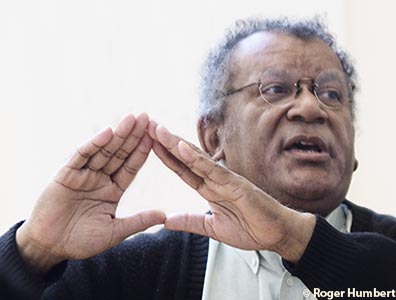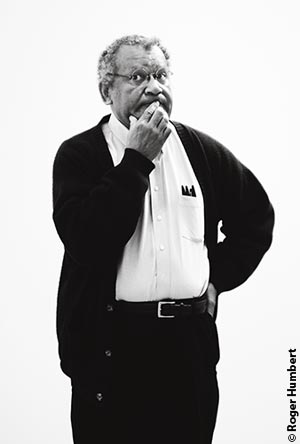

guelphjazzfestival.com
|
Anthony Braxton (Wesleyan University) – Keynote Address: Tri-Centric Modeling
at the Guelph Jazz Festival |
|
| September 7, 2007 • Macdonald Stewart Art Centre • Guelph |
|
|
|
|
"From a transidiomatic perspective ..." (Anthony Braxton)
by David Fujino with photos by Roger Humbert |
Anthony Braxton spoke into the microphone.
His eyes darted up, and he spoke in an almost breathless, unstoppable line of thought, occasionally pausing to clarify a point.
|
Both hands often formed a triangle, then a rectangle, as he set about identifying and naming elements in his philosophy of music, Tri-Centric Modeling.
Meanwhile, a technician played recorded CD selections to illustrate Braxton's "Language Types" (as in multiphonics and long sounds); "Geometric Scheme" (as in multiple logics and sound mass logics); and "Identity State" (as in dreams and sound imagery).
Judging from the audience faces, the lecture was challenging.
|
|
 |
|
You see, Braxton had no script in hand to read from, although he did give us a schematic handout with lists and graphic diagrams on it.
He basically delivered an Artist's Statement, and when he spoke about things like "idiomatic sound states" — without actually defining these terms — his concepts, to me, still felt sensible and open. I figure he was saying his music was not part of the styles — or "idiomatic sound states" — that prevailed and still prevail in music. Back then, he knew where he didn't want to go.
In many ways, this Address felt like an aesthetic summation based on 40 years of living, performing, and research; years he described as a mystically-based "navigation through form".
It all started for Anthony Braxton when he discovered the AACM (Association for the Advancement of Creative Musicians) way back in the 1960's in hometown Chicago. At that point, Braxton said his life was forever changed. The AACM meant everything to him.
|
But he also knew his creative interests were "transidiomatic versus ethnocultural" — in other words, Braxton already knew his music was outward bound and he was leaving behind idiomatic certainty and strictly African-American definitions of the self.
So during the idiom-heavy 60's period of Black Power, Flower Power, Yellow Power, and Viet Nam, Braxton's praise of white musicians like Paul Desmond, and composers Webern and Stockhausen, was all the more startling simply because it came from an African-American musician.
The fact is that Anthony Braxton, the one-time philosophy student, has been 'transidiomatic' for at least 40 years.
And — irony of all ironies — it turns out that a key to Braxton's highly evolved music lay in a simple phrase he used, "the friendly experiencer."
When a man in the audience asked what 'the friendly experiencer' was, Braxton answered that the 'friendly experiencer' was someone who is nice. The audience laughed comfortably.
|
|
 |
|
And when he added the observation that "Musicians and people should just be nice", I suddenly realized — in a kind of mini-aperçu — that Braxton's multidirectional and transidiomatic music, ultimately, is a music of love.
Coda – Here's some memorable remarks made by Braxton during his "Tri-Centric Modeling" talk: Wherever he was in his music production, he said he was never separated from complete improvisation; he also said he considers himself lucky if, at times, he can play "5 seconds of good music in a 25 minute time span"; then he finished the Q&A section, and said with a smile, "Music makes the world go round."
|
|
|
|
|
|
|




